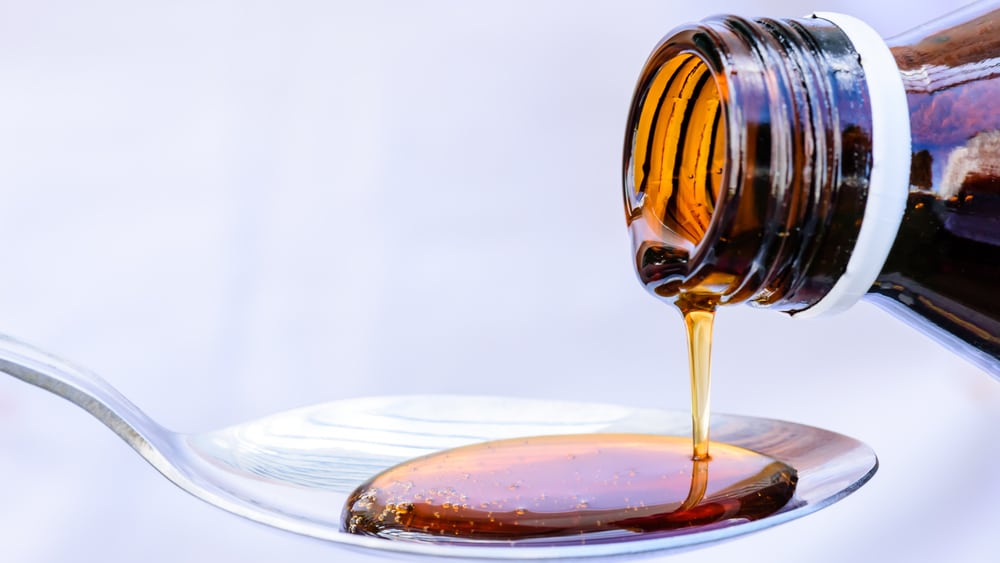
What is Lean?
Lean is a drink that combines powerful cough medicines with other easy-to-find ingredients—like candy and soda—to create a recreational drug beverage. The cough medicine-based drink is also sometimes mixed with alcohol to heighten the effects of the beverage. Lean is known by many names, including:
- Purple drank
- Dirty Sprite
- Texas Tea
- Sizzurp
- Syrup
- Barre
Combining cough syrup and other ingredients is a relatively new practice in the world of substance abuse, but a troubling one nonetheless. With its powerful base of opiate cough medicine, lean can lead to many concerning consequences.
Lean as a Drug
 If you are unfamiliar with common illicit substance combinations, you may wonder: what’s in lean? Why is it so dangerous?
If you are unfamiliar with common illicit substance combinations, you may wonder: what’s in lean? Why is it so dangerous?
Lean is made when certain cough medicines are mixed with hard, fruity candies or bubbly soft drinks. This may sound harmless, but the primary substance used in lean is cough syrup which contains codeine. Codeine, a powerful opiate, is primarily used to treat moderate to severe pain or is used in prescription cough syrup as a cough suppressant.
The presence of the opiate, codeine, also considered a narcotic, is what makes lean so dangerous. Cough medicines containing opiates are potent and powerful. So powerful that the drink’s popular moniker “lean,” comes from the position its users are supposed to end up in after consumption.
Is Lean Addictive?
The recreational drug cocktail lean, is addictive and dangerous. On average, lean drinks contain more than 25 times the dose of codeine recommended for pain relief. Additionally, one of the most troubling concerns is the presence of other active ingredients in the prescription cough medicine that may interfere with the codeine.
Other Active Ingredients in Codeine-Based Cough Medicines
Some prescription cough medications that contain codeine also contain antihistamines that act as sedatives. When abused, taken in high doses, or mixed with other substances, this combination can impair your motor functions.
Other cough syrups may include narcotics that produce feelings of relaxation or high or psychoactive ingredients that alter your mind. With strong ingredients like these, abuse is incredibly dangerous. Ingredients that produce such potent effects are often addictive, leading to physical dependence, withdrawal symptoms, and drug cravings.
Why is Lean so Popular?
Lean is widely known due to its prominence in pop culture. First created in Houston, Texas, it has evolved into a pop-culture phenomenon and is featured in numerous songs, movies, and television shows. The buzz around lean drink and the attention it has received from prominent celebrities has only contributed to its dangerousness.
The codeine in lean drinks acts as a cough suppressant and a pain reliever. This particular pain reliever, though, is intended to be taken under the care, recommendation, and instruction of a medical professional and an individualized prescription. Codeine abuse, facilitated by drinking lean, produces desired effects in an individual, such as:
- Mild euphoria
- A feeling of being “high”
- Sensations of disassociation with the body
If you were given a prescription for codeine, it is likely because you have mild to moderate pains that are unresponsive to less potent or non-prescription pain relievers, like Advil. However prescriptions are abused every day, and many prescription drugs can be purchased or traded illicitly. And many individuals choose to abuse prescription-strength cough medications.
Lean Abuse Side Effects
Because the cough medications used to make lean drinks contain different opiates, narcotics, and strong antihistamines, this drink can cause a wide variety of unpleasant or dangerous side effects. Over time, it can even impair your mental and physical health.
This illicit concoction is popular among younger demographics, although it is not the most common addiction within this group. The most common addictions among college students include alcohol, benzodiazepines, marijuana, stimulants, and ecstasy. Still, many young people have suffered both short and long-term damage to their health after abusing lean.
The side effects that you experience on lean may vary depending on several individual factors. The amount you drink each time, how often, and the cough medicine you use can alter your side effects. However, some side effects are more common than others. These include:
- Seizures
- Sedation
- Headaches
- Stomach pain
- Hallucinations
- Vision changes
- Trouble breathing
- Difficulty urinating
- Coordination problems
- Rashes, hives, and itching
- Fevers and sweats or shivering
- Nausea, vomiting, and diarrhea
- Feelings of agitation or confusion
- Severe muscle stiffness and twitches
The main concern with codeine is its ability to slow the breathing of the person drinking it. In some cases, this can lead to a person ceasing breathing entirely. If someone is using lean and it is hard to wake them up, they have blue lips, and they take long pauses between breaths, emergency medical attention is necessary to make sure they don’t stop breathing.
The Legality of Lean
When it comes to whether or not lean is legal, the answer lies in a gray area. Codeine is classified as a Schedule II drug by the Drug Enforcement Administration (DEA). It’s considered a controlled substance, but a lesser one. Mixed with other ingredients, though, it is a powerful substance. This is why it is only available with a prescription.
Some states do allow people over the age of 18 to buy cough syrup with codeine over the counter. To mitigate misuse, though, the most popular brand of codeine-based cough syrup, Actavis, was taken off the market entirely. Additionally, the distribution and manufacture of any products containing codeine is explicitly illegal.
The Dangers of Mixing Codeine and Other Substances
As previously mentioned, codeine is habit-forming, and it has the potential to lead to life-threatening side effects. When you mix it with other substances, it becomes increasingly dangerous. Mixing a potent and addictive opiate with fillers like candy and soda may make it taste better, but it also makes it easier to forget how much you have ingested.
This can lead to dangerous levels of codeine, narcotics, or antihistamines traveling through your system. These high levels increase your chance of overdosing. Mixing lean drink ingredients with alcohol takes it to another level. This can cause respiratory depression, which reduces the amount of oxygen getting to your brain. Other effects such as liver damage, coma, and death are also linked to respiratory depression.
There is some evidence that certain famous pop culture icons and rappers have suffered impairments due to their lean abuse. These impairments include hospitalization for seizures, near-death experiences, and arrests. High-profile athletes have also made the news after they were suspended or hospitalized for their lean abuse.
Mental Health and Lean Addiction
 We’ve answered the question: what is lean? But what does it have to do with mental health? The ingredients in lean slow your brain activities and create euphoric, relaxed feelings. Unfortunately, drugs with mind-altering effects of this kind are capable of damaging your mental health. Abusing lean can lead to brain lesions and memory loss, uncharacteristic changes in your behavior, and other troubling cognitive impairments with long-term use. Increasingly serious side effects such as permanent psychosis is also possible.
We’ve answered the question: what is lean? But what does it have to do with mental health? The ingredients in lean slow your brain activities and create euphoric, relaxed feelings. Unfortunately, drugs with mind-altering effects of this kind are capable of damaging your mental health. Abusing lean can lead to brain lesions and memory loss, uncharacteristic changes in your behavior, and other troubling cognitive impairments with long-term use. Increasingly serious side effects such as permanent psychosis is also possible.
If you have a pre-existing mental health condition when you start drinking lean, it may become worse. Dual diagnosis is the term for co-existing mental health disorders and addictions. The best way to improve your addiction, and mental and physical health when you have a dual diagnosis is to treat them simultaneously. A dual diagnosis program is a comprehensive and highly specialized care plan that treats both mental illness and addiction.
Lean Drink Withdrawal Symptoms
Most codeine-based cough medicines contain multiple ingredients that alter your brain chemistry. One way it does this is by tricking your brain into producing more dopamine, the feel-good chemical produced by your brain’s reward system. Unnatural increases in this chemical can lead to addiction, drug cravings, and a loss of control.
One clear sign of addiction is seeing the damaging toll drugs are taking on your life but being unable to stop using drugs. Drug cravings can be persistent and overwhelming, making it hard to quit. Withdrawal symptoms can be so overwhelming that they lead to relapse if you are not prepared for them. Codeine withdrawal can include a number of unpleasant symptoms including:
- Anxiety
- Nausea
- Agitation
- Vomiting
- Insomnia
- Body pains
Thankfully, there are ways to safely detox from lean and prevent relapse. With supervised medical detox, the symptoms of withdrawal are managed. This allows individuals suffering from a lean addiction to avoid returning to substance abuse to stop uncomfortable withdrawal symptoms.
Lean Addiction Treatment Options
There are no one-size-fits-all solutions when it comes to addiction care. Lean addiction is considered an opiate addiction, and this type of addiction requires specific treatment to ensure recovery. The types of treatment recommended for opiate addiction include:
- Partial Care Program: A partial care program, provides addiction treatment for 5 to 8 hours a day, 5 to 7 days a week. It’s considered to be the most intense form of outpatient care and can be a segway from inpatient to standard outpatient.
- Intensive Outpatient Program (IOP): IOPs are a more rigorous type of outpatient program. This program is best suited for addicts who need more intense treatment than regular outpatient rehab can provide.
- Medication-Assisted Treatment (MAT): Medication-assisted treatment is usually recommended for patients with addictions to either alcohol or opiates. Intervention with medication is used to lengthen the amount of time a patient is sober to foster life-long sobriety.
Each program available is uniquely designed to address your addiction, concerns, health, questions, and peace of mind. From our first phone call to when you feel ready to step back into the world, we work with you to determine the treatment options that best suit your needs.
Recovering from a Lean Addiction with North Jersey Recovery Center
At North Jersey Recovery Center, we specialize in high-level, customized addiction care. We meet you where you are in your recovery journey and help you get to where you need to be. We are with you through every step of this process. Here, you will build all of the resources, tools, knowledge, skills, and support systems you need to pursue a different life. And you will do so while receiving ongoing care, support, and guidance. Contact us today to get started.










